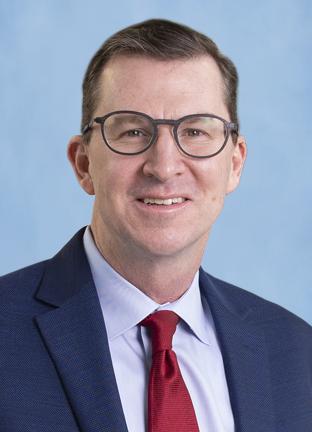Michael J. Englesbe, M.D. is a busy man
An associate professor in the University of Michigan’s Transplant Surgery Division, Englesbe specializes in liver transplantation in children and adults. He started the multidisciplinary pediatric portal hypertension clinic. He also performs surgeries for living kidney donation and dialysis access.
But when he’s not saving lives, Englesbe has another passion: working with young people to help identify the surgeons of tomorrow, then nurturing their nascent interest and guiding it forward.
Sharing knowledge and helping others reach their potential seems inherent in Englesbe; his grandfather was a professor and his mother a first grade teacher.
After undergraduate studies at Yale, Englesbe earned his medical degree from the Robert Wood Johnson Medical School in 1997. He then came to Michigan for a general surgery residency. After a post-doctoral fellowship at the University of Washington Medical Center in Seattle, he returned to the U-M to complete a two-year fellowship in multi-organ transplantation surgery. He joined the faculty in 2006 and has been at Michigan ever since.
Englesbe directs the M3/M4 surgery clerkship program, where he has rewritten much of the curriculum and surgery oral examinations. He has also mentored a large number of students in their research careers, and says he is particularly proud that, since 2009, students who have worked with him as their primary mentor have first-authored more than 50 manuscripts and given more than 100 academic presentations.
Englesbe also heads the Academic Surgeon Development Program (ASDP) – a committee of medical students, surgery residents and faculty united to draw the best and brightest to the field of surgery.
“The goal of the ASDP is to train a highly diverse group of the most promising undergraduates, medical students and surgical house staff to become future leaders in surgery through research teaching, mentorship and shadowing opportunities,” says Englesbe. He and his colleagues have developed a longitudinal core curriculum as well as an innovative practice-based program that provides hands-on research and leadership training.
Since the inception of the ASDP in 2012, the initiative has grown rapidly and with great success, under Englesbe’s watch. Today, it attracts hundreds of students from across the medical education spectrum to program offerings including the following:
- Reaching out to undergrads
The ASDP introduces undergraduate students to key issues and the breadth of careers in the health sciences. Undergrads pondering a career in medicine are invited to the Clinical Simulation Center where surgery medical students and residents offer tutorials in suture tying. - Connecting with future medical students
The ASDP collaborates with the U-M Medical School Admissions Office to showcase the Department of Surgery’s clinical endeavors to groups of prospective medical students. M4 students host sessions in the Clinical Simulation Center, teaching basic skills and sharing their passion for medicine and love of the Medical School. - SCRUBS
SCRUBS is a student group comprises current M1 and M2 students who are considering a surgery residency. Program offerings include informal lunchtime gatherings during which a surgery faculty member speaks on a specific topic and answers questions about the day-to-day life of a surgeon. Six to seven times a year, thoracic surgeon Mark Orringer, M.D., invites SCRUBS members to his home for a dinner, a presentation, and Q & A session with a surgical specialist. Another popular SCRUBS program is the Surgery Olympics – a fun, educational competition designed to hone surgical/clinical skills while building teamwork and professional collaboration. - Young Academic Surgeons Summer Fellowship
This is a 10 week summer curriculum for medical students interested in surgery. It involves research projects and academic skills development. Further, students complete a comprehensive clinical skills program. This summer, 35 second-year Michigan medical students will participate.
Englesbe says he is deeply proud to call the U-M home.
“Every surgeon I know here is proud to be a Michigan surgeon,” he says.
“I personally enjoy sharing my enthusiasm for surgery as a career. Showing a medical student their first transplant… it’s a miracle every time. I love seeing medical students turn into confident young clinicians. And I love that my partners, trainees and students teach me things every day.”


